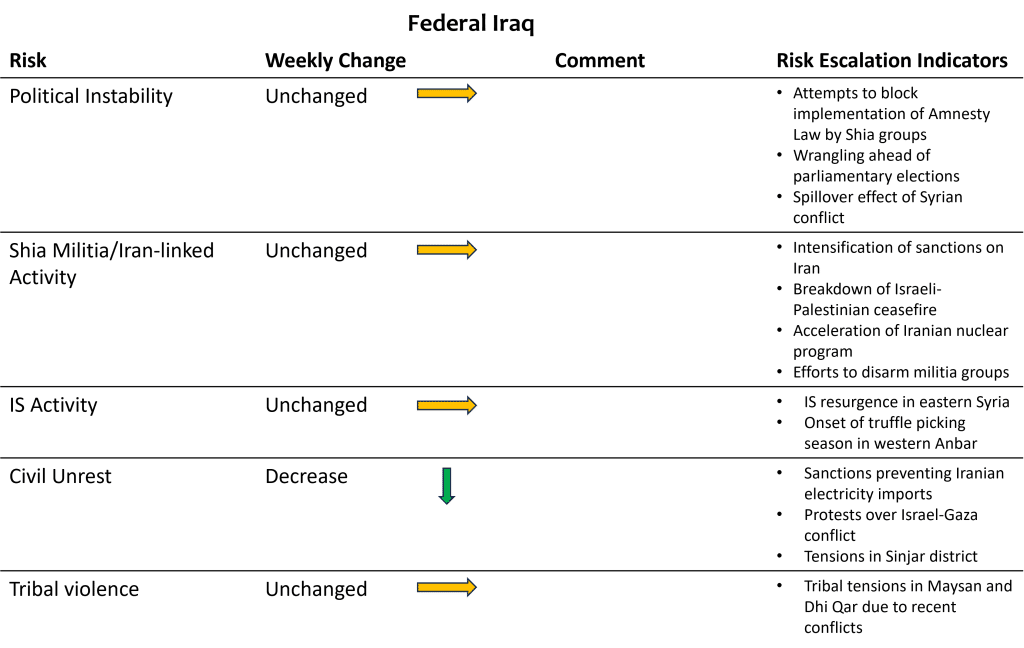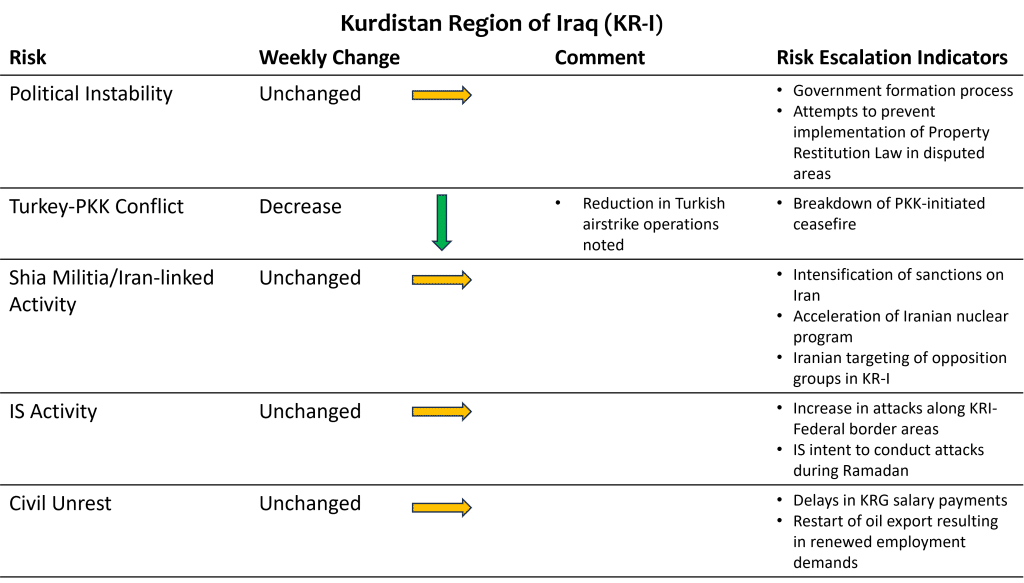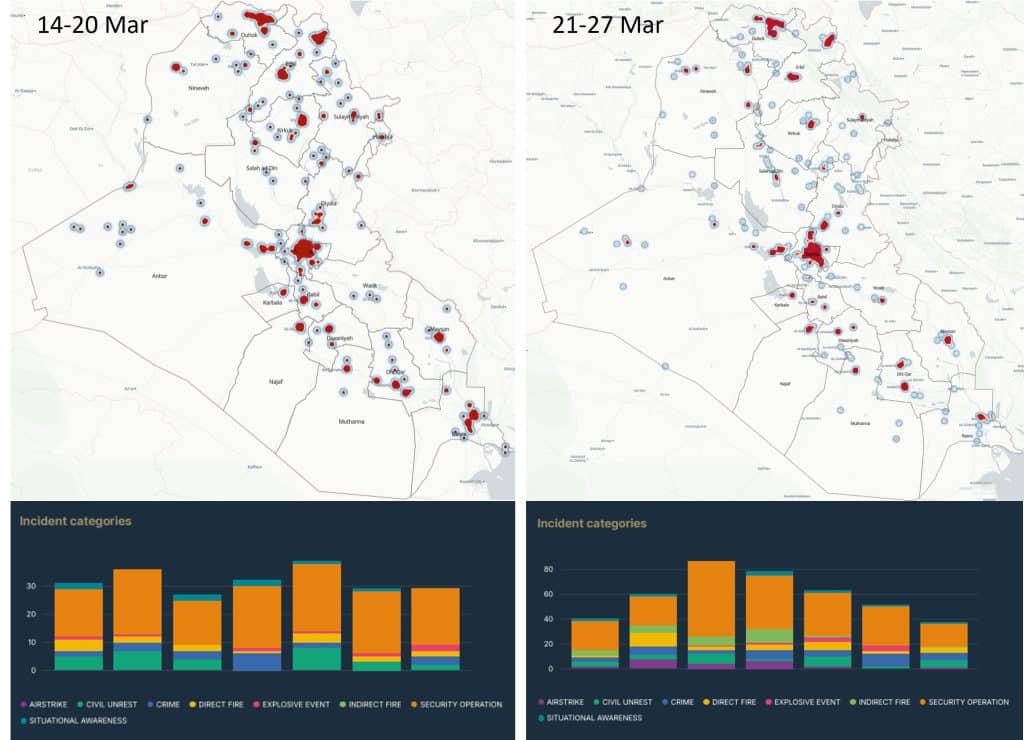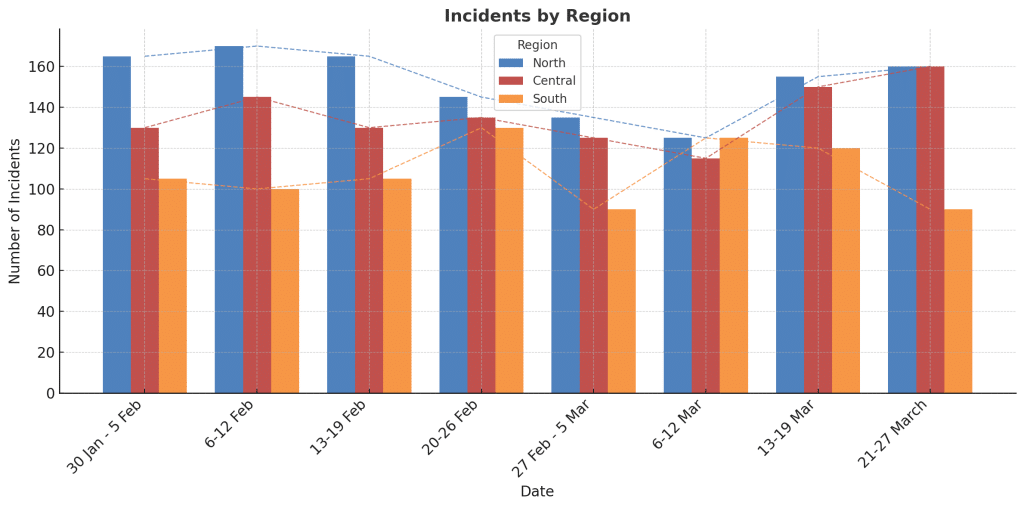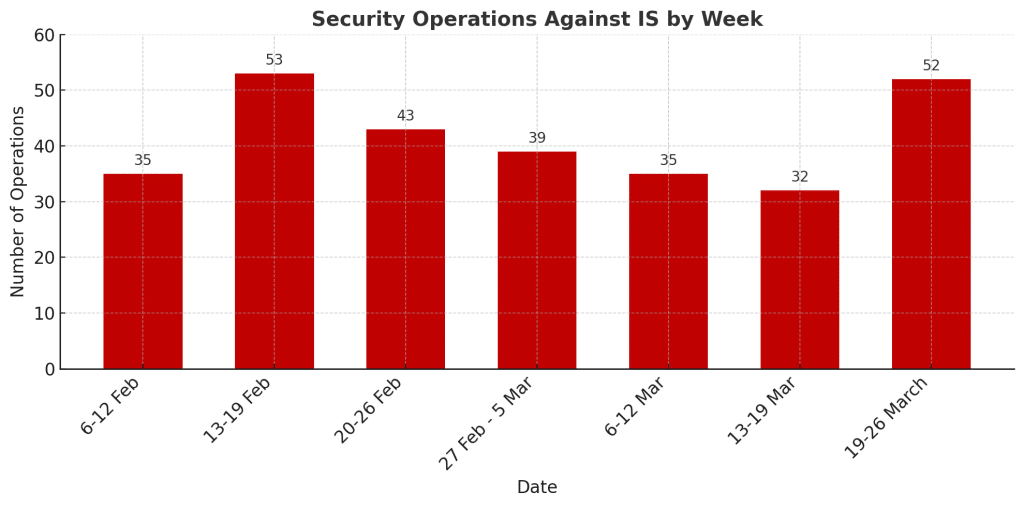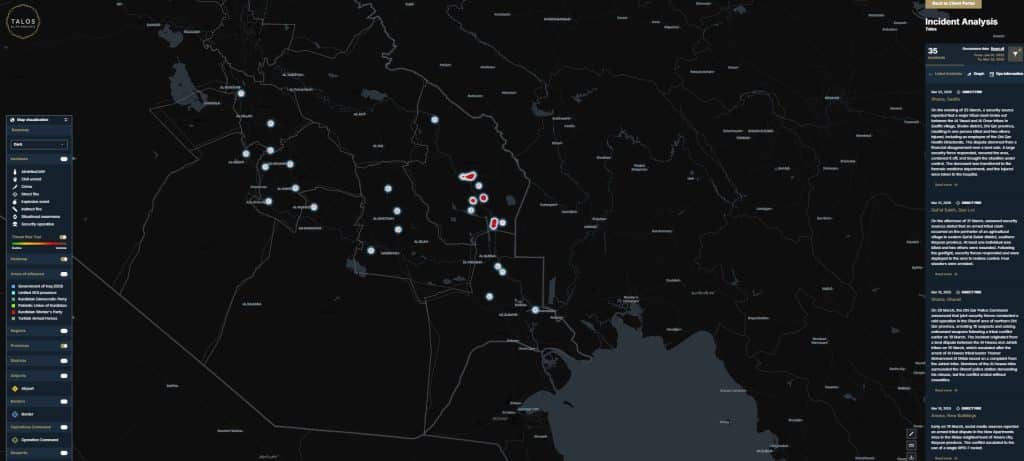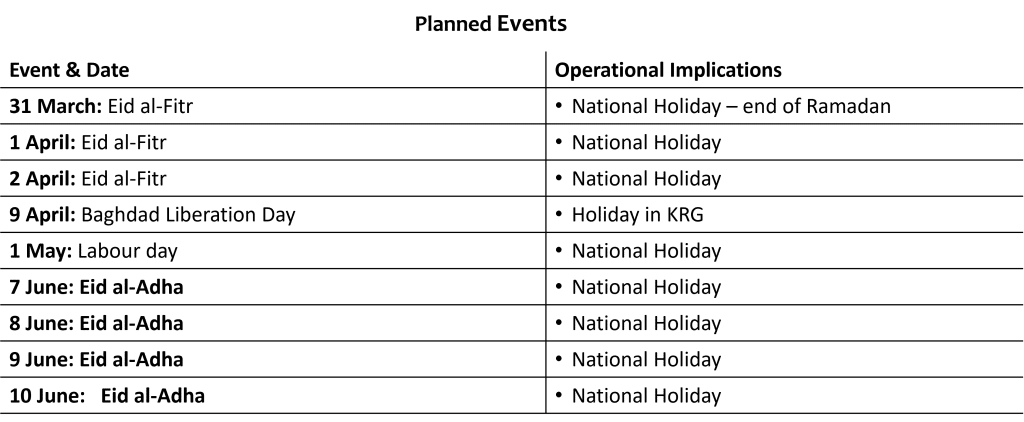Weekly Incident Map
Executive Summary
Escalation in US-Houth hostilities following breakdown of Gaza ceasefire
PKK-linked sources report attacks despite ceasefire announcement
Tensions in Sinjar reduced following agreement
IS activity subdued over Ramadan as arrests continue
Hostilities in Baghdad linked to local disputes
Limited violence in Basra province
Tribal clashes reported in Maysan and Dhi Qar provinces
Escalation in US-Houth hostilities following breakdown of Gaza ceasefire
Regional developments and associated US-Iran tensions continue to revolve around the escalation in hostilities between the US and the Houthi Movement. To recall, the Houthi Movement last week resumed ballistic missile and UAV strikes against US and Israeli targets in response to the breakdown of the ceasefire between Israel and Hamas. Over the week, the movement claimed responsibility for multiple operations targeting US warships deployed to the Red Sea as well as long-distance attacks against targets in Israel. The latter includes strikes targeting the Ben Gurion Airport in Tel Aviv on 23 March that resulted in a suspension of flights lasting several hours. In response, the US intensified airstrikes and precision operations against several targets within Yemen, killing several high-value Houthi operatives and material assets utilized by the group.
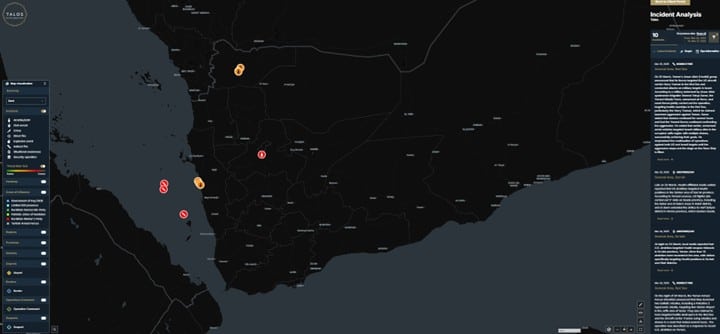
Airstrike and ballistic missiles, Yemen 21-26 March
The escalation represents the most significant regional repercussions so far to the Israeli-Hamas conflict yet concerns linger of possible spillover effects in other areas associated with Iranian presence. In Iraq, the direct repercussions have so far been limited to demonstrations denouncing Israel and US support for Tel Aviv, yet limited reports over the week suggested a possible threat linked to alleged Houthi presence in the country. According to media reports of questionable veracity, the Houthi Movement evacuated offices in Baghdad in response to threats that their presence may incentivize attacks by US forces in Iraq.
The initial source appears to be a Saudi news channel, alleging that Iran warned the Houthi Movement and their connections in Iraq that the escalation in Yemen may backfire in Iraq. Separate reports stated that the Houthis may expand their presence in Diyala province through coordination with PMF and Iran-linked factions based there. In response, the Joint Operation Command denied the veracity of the reports and said there is no Houthi presence in Iraq. The statement dismissed the reporting as “completely false” and urged media outlets to ensure accuracy.
While reports circulating this week as assessed as unreliable, Iraq-based militias and Houthi militants have long maintained relationships which have likely expanded since October 2023 as attacks against Israel were often carried out in a coordinated fashion. Furthermore, information exchanges and operational expertise have likely been exchanged between the groups as the Houthis retain a significant background in missile and UAV operations against Israel. So far, these connections have not affected security dynamics in Iraq which remain contained and historically unaffected by developments in Yemen, and there are no credible indications so far that the escalation in Yemen will impact Iraq.
PKK-linked sources report attacks despite ceasefire announcement
A reduction in Turkey-PKK conflict activity continued to be observed over the week, as the PKK-initiated ceasefire on 1 March has contributed to a reduction in activity initiated by both sides. This week, only one credibly reported airstrike was reported in the KR-I, with the strike targeting a PKK position on the Metina Mountain on 25 March. Limited Turkish operations were also reported, including ground clearance operations that resulted in the destruction of PKK-linked assets, tunnels and logistics sites. More significant engagements were not reported, however – in a pattern consistent with trends observed in recent weeks.

Turkey-PKK activity 21-27 March. White dots denote unconfirmed events.
Regardless, PKK-linked sources continue to report Turkish airstrike activity via less credible channels. HPG-linked media claimed daily airstrikes and artillery operations were conducted on a daily basis during the week, targeting established conflict zones. Notably, the same sources noted that the PKK also initiated several attacks against Turkish forces over the week.
The reports lack confident corroboration and have not been verified, but stand out as noteworthy given the current context and the PKK-initiated ceasefire on 1 March. While claims of Turkish airstrike activity can be attributed to propaganda efforts that aim to portray the Turkish side as the aggressor, the claimed operations launched by the PKK defy simple explanations as this would contradict the call by the PKK on 1 March. The reports may be indicative of internal disagreements within the PKK and a refusal of some elements to obey the ceasefire call – a possibility fully plausible given the complex and diverse structure of the organization.
Tensions in Sinjar reduced following agreement
The situation in the Sinjar district of Nineveh province stabilized over the week following the escalation and clashes last week between the Iraqi Security Forces and members of the Sinjar Resistance Units (YBS) (see our full report for further context and background). On 22 March, an agreement was reportedly reached between the ISF and the YBS, under which the Iraqi Army agreed to withdraw from the district center. In exchange, residents removed a protest tent set up in front of the National Intelligence Office in the district, while both sides committee to cooperate to avoid further tensions. The agreement is assessed to have contributed to a reduction in tensions as no further hostilities were noted over the week. Broader political ramifications have also been limited as a result, with all sides involved assessed to downplay the implications of the clashes last week.
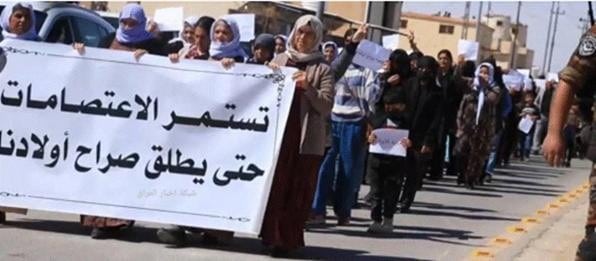
Protesters in Sinjar district demand release of YBS members
Despite this, demonstrations have been reported in the district over the week, calling for the release of the five YBS members detained in connection to last week’s event. On 25 March, residents in the Sununi sub-district organized a march from the Sununi Municipality Department to the Martyr Mam Zeki Roundabout. Demonstrators stated their intention to continue protesting until the detainees are released. The next day, members of the YBS Women Units also stated their intent to continue demonstrations until all detainees were released. While peaceful, these gatherings underscore remaining disagreements and grievances that will risk additional demonstrations in the district over the near term. Local sources also suggest that tensions remain elevated despite the agreement, with the possibility of renewed escalation and a sudden shift in security dynamics forming a consideration over the near term.
IS activity subdued over Ramadan as arrests continue
IS activity levels were subdued over the week and no further attacks, clashes, or plots have been recorded since last week’s engagement in the Tuz district in Salah ad Din province. As expected, the clashes – which included the detonation of a suicide bomber to avoid capture – generated an intensified security response in Salah ad Din as well as in surrounding provinces with an uptick in security operations noted (see table below).
Most notably, these operations resulted in the arrest of the two surviving members of the IS cell involved in the clashes in Tuz district the previous week. Security forces said the two were detained during an operation in the Ghamas area of Salah ad Din. Security sources also reported that one of the deceased IS members was a mid-level IS leader and had been wanted for more than a decade on terrorism charges. Units also recovered various materials including cell phones, which intelligence personnel will almost certainly exploit to identify names, phone numbers, and geodata associated with IS members to conduct follow-on operations.
A heightened security posture can be expected to remain in the country for the remainder of Ramadan, with additional measures to be implemented ahead of Eid al-Fitr. On 26 March, the Ministry of Interior announced that the security plan would focus on securing religious sites, markets, and parks. The plan includes a ban on motorcycles and horse-drawn carts in crowded areas, monitoring of harassment, reckless driving, and begging, and prohibitions on fireworks and toy guns. Civil defense teams will be deployed in key areas, and safety inspections will be conducted at hotels, restaurants, and public facilities. Citizens were urged to cooperate with traffic police to reduce congestion.
Hostilities in Baghdad linked to local disputes
Hostile activity in Baghdad city and the surrounding areas was characteristically limited to low-level violence linked to local and criminal disputes, with limited impact on overall security dynamics. Early on 20 March, social media sources reported that a gunfight erupted over a dispute between two individuals at the Ali Luz Restaurant in the Karradat Maryam area, central Baghdad. No further developments were noted but the incident underscores the persistent threat posed by the widespread presence of firearms and the associated need to be prepared to react to SAF incidents in otherwise stable environments.
Late at night on 24 March, various security and other sources reported that a fight involving several individuals escalated into a shooting at the Nahda Garage car showrooms in eastern Baghdad city. The conflict reportedly arose from a financial disagreement between two business partners, and three brothers opened fire on a car showroom owner and his son, killing the father and injuring the son, who was transported to a hospital. All three suspects were arrested. The Baghdad-Rusafa Police Command later confirmed the incident and arrest of several individuals involved.
Later, on the morning of 26 March, unnamed security sources reported that a hand grenade detonated outside a residence in the Za’franiyah area of eastern Baghdad. Security forces responded and quickly arrested the perpetrators. The Federal Police Command and the Baghdad-Rusafa Police Command later confirmed the arrest of two suspects involved in the attack. Separately, on the afternoon of 26 March, social media sources reported that unidentified gunmen placed a hand grenade, with the safety pin still attached, in the garage of a woman’s house in the Ubaidi area of east Baghdad city. Footage from the scene depicted the grenade emplaced underneath a car.
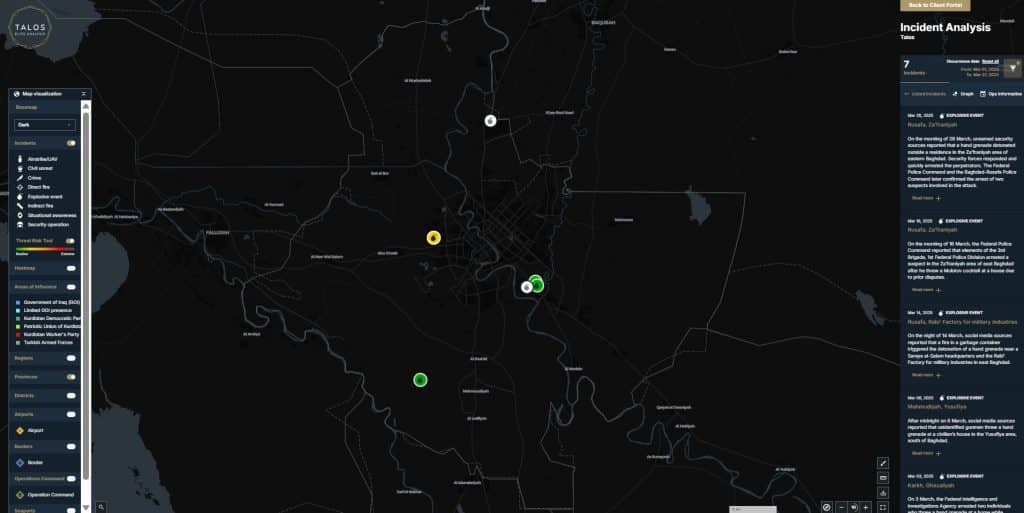
Grenade incidents reported in Baghdad province during March 2025
The circumstances of the incident remain unclear but the event is consistent with assessed intimidation-style attacks typically employed as part of local or criminal disputes. The incident is the seventh involving grenades in the Baghdad province since 1 March, with the majority comprising low-level detonations causing no casualties (see image above). The vast majority of these have been recorded in east Baghdad, and areas characterized by high levels of social and criminal violence.
Limited violence in Basra province
An overall reduction in hostilities was noted this week in the Basra province – a trend attributable to Ramadan and consistent with an expected lull typically seen during the religious month. The most noteworthy incident occurred on 20 March, when the North Basra Police Directorate reported that unidentified individuals described as outlaws opened fire on an employee of the Arkan al-Fayhaa Company while he was driving at the West Qurna-2 Oilfield in northern Basra province. Following the incident, North Basra Police Chief Major General Ali Mashari formed a security team to investigate the shooting. A security operation was subsequently launched in the area with no results announced.
Other hostilities were limited to localized and low-level violence. On 24 March, unnamed security sources stated that security forces found the body of an elderly woman, estimated to be between 70 and 80 years old, dumped near the riverside close to the five-A-team stadium in the Muqafaqiyah area of Basra province. Further details regarding the circumstances of her death were not provided but such incidents are typically attributed to local or family-related disputes. Late on 25 March, unnamed security sources stated that two individuals were stabbed and wounded during a fight in Khor al-Zubayr sub-district in southwestern Basra province. Security forces responded and arrested suspects involved in the incident, with no further repercussions noted.
Tribal clashes reported in Maysan and Dhi Qar provinces
A reduction in tribal hostilities was also noted over the review period in comparison to the previous week, however two noteworthy incidents were recorded in Maysan and Dhi Qar provinces. On the afternoon of 21 March, unnamed security sources stated that an armed tribal clash occurred on the perimeter of an agricultural village in eastern Qal’at Saleh district, southern Maysan province. At least one individual was killed and two others were wounded. Following the gunfight, security forces responded and were deployed to the area to restore control.
The next day, a security source reported that a major tribal clash broke out between the Al ‘Awad and Al Omar tribes in Sadifa village, Shatra district, Dhi Qar province, resulting in one person killed and two others injured, including an employee of the Dhi Qar Health Directorate. The dispute stemmed from a financial disagreement over a land sale. A large security force responded, secured the area, cordoned it off, and brought the situation under control. The deceased was transferred to the forensic medicine department, and the injured were taken to the hospital.
Also in Dhi Qar province, security forces reportedly stormed the house of activist Hassan Abu Kawthar in the Shuhadaa neighborhood of Nasiriyah city. Social media sources claimed that smoke grenades and gunfire were used, and the activist’s father Ehsan was arrested. A video showed a confrontation between the household and police, including a firearm discharged toward the roof and stones thrown at the force. Later, the Dhi Qar Police Command stated that security forces had responded to individuals burning tires and blocking a road near Ibrahim Khalil to demand a detainee’s release. Upon moving to a suspect’s house, the force was attacked with gunfire and stones, injuring eight personnel, some critically. Three suspects were arrested, and security forces seized an AK-47 rifle, a PKM light machine gun, a handgun, and spent bullet casings.
Disruptive protest in Muthanna and Babil provinces
Noteworthy protest activity in the region included two disruptive and violent demonstrations in Muthanna and Dhi Qar. On the morning of 24 March, members of the Al-Fartus tribe protested and blocked the Muthanna–Dhi Qar Highway in the Daraji sub-district, Muthanna province. The protesters denounced the poor service situation in their area, explaining that the region suffers from a lack of water, electricity, and infrastructure. They called on the local governorate to intervene and implement service projects that meet their needs.
Meanwhile, well-known activist Durgam Majid organized a protest march, commencing in the Babil province, to denounce US support for Israel. The initial announcement called for protesters to march towards Baghdad city for a unified assembly near the US Embassy however on the evening of 23 March, multiple sources reported that the protesters were prevented entry into Baghdad province by security forces. Footage showed a gathering near checkpoint 75 with no altercations or violence noted.
In a subsequent statement, Majid acknowledged that the protesters failed in their objective to reach Baghdad but that the march served as a starting point for a larger protest against the US. Additional gatherings can therefore be expected in the coming days linked to the issue. This will most likely include both organized demonstrations as well as more spontaneous gatherings in Baghdad and the southern region.
Risk Levels, Risk Escalation Indicators & Planned Events
